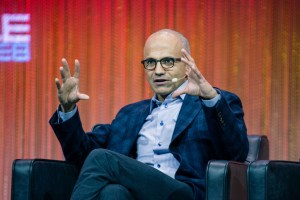GamesBeat: Do you have multiple release strategies for these productions?
Tellem: What’s great about this is there aren’t any models. We’re going to be experimenting with a lot of different ways in which we can distribute. Obviously, we can start with our platform. You look at the Xbox platform, at tablets. The service we’re trying to build can live on the console and off the console as well.
As you look at the portfolio and the types of shows we’re looking at, each will be dictated by a different model or a different distribution plan and strategy. Unlike our old business, where you had to fill slots, it’s a pretty open-ended platform. We’re not restricted by formats. We’re not restricted by length of content. We’re seriously looking at certain things that will be in front of a paywall or behind it. The focus is to enhance the value proposition for the Xbox Live subscribers. Original content, for us, will be the differentiator. We can always say that either it will be only on Xbox or best on Xbox. That leaves a little bit of room.
GamesBeat: Is there an advertising component as well?
Tellem: The way we’re looking at it right now, certain programs will be supported by advertising. To tell you the truth, we’re kind of reframing our presence there, as far as our existence and what our content focus is.
GamesBeat: Can you talk about the support within Microsoft given the CEO changeover?
Tellem: This has been an amazing year and a half. For me, the transition from CBS to Microsoft is like an entirely different world. The way that processes are … they’re similar, but it’s more complex. It took me a good year to figure it all out, and I’m still learning. But it’s easier now. We went through the [reorganization]. The whole concept of one Microsoft made total sense to me. I think people are embracing that concept.
With Satya Nadella, even in the short tenure that he’s been CEO, he’s resetting everyone’s perspective. He’s very focused on the consumer. He’s focused on making sure that there’s a lot of usage in all of our software content. He’s very supportive of what we’re trying to build. … Not that we’re incumbents by any means. We’re challengers. Certainly, I feel that way in what we’re trying to build here.
GamesBeat: What do you feel about the prospect of your competition being able to get more and potentially better shows?
Tellem: We have Netflix, Hulu, and Amazon on our platform. It really isn’t a question of competing with them. We aren’t. What it is is trying to figure out our audience. We’re offering up an amazing service that involves 100 apps right now. We have incredible games. They’re offering linear content. They don’t have that kind of interactive opportunity that we’re going to capitalize on. I don’t see us in a competitive situation at all.
If I hear, “Oh, Netflix bought this show,” that’s great. It gives another opportunity for people to use our service to access Netflix content. That’s a good thing.
GamesBeat: Would you offer other streaming services opportunities to use your interactive elements?
Tellem: Sure. Last year we did a deal with the NFL where we’re doing just that. We’re offering realtime personalized highlights and updates to your fantasy league. You can snap to Madden during halftime. … Like I said, it’s either best on or only on. That’s our focus.
GamesBeat: Is interactivity your big differentiator when you’re talking to production companies about coming to the platform?
Tellem: I think the big differentiator is us. There is some seriousness to that. We’ve been in the business a long time. We know these guys really well. We know the community really well. They understand the bar that we’re trying to set. That’s not to say that we’ll hit it with every show. We also know that in this business, there’s a lot of failures and a few successes. But if we can keep the content at a certain level, at a very high level, and also add that interactive capability that helps us support a creator’s vision, that’s a big differentiator.
To your point about competition, everyone has a different agenda as far as what they’re trying to accomplish with original series. For Netflix, I think original series was a differentiator, and in the future, it may protect against other content providers who’ll be more resistant. Amazon has another model. For us, our focus is on using our console and people who are subscribing to our service. Between these game announcements and releases, we offer content that will keep them engaged and on our service.
Levin: One of the things that helps us competitively, when you’re doing pitches or trying to explain what you’re looking for, is that there’s a focused target here against millennials with a male lean. We’ll expand and grow out. But I think when you start to get into nonlinear services, subscription video-on-demand services, one of the biggest challenges is there’s no forcing function to decide how much you can do, how much you can support, how much you can buy. Companies can get sucked into potentially losing their focus and not being able to articulate what their needs are because they have open and unlimited shelf space.
For us, we’re fortunate to start with a base. We’re trying to find out as best as possible what’s going to appeal to that base. Those other services are growing in a manner that’s a bit similar to basic cable services. They started off purely licensing content. They built their backs on licensed content. Then, slowly, they’re starting to introduce original content as a point of differentiation, and, as a result, charging more for that content, either on a subscription model or an ad-supported model or some combination.
As the media landscape fractures and as these models evolve in a very fluid manner, you’re definitely getting to a point where everyone tries to figure out what makes the most sense for their business. We’ve seen a lot of people come in. They view this opportunity as something exciting to them because it’s new. That’s the type of executive we’ve attracted. Certain creators really like that. They want to try and figure that out with us. A lot of it is based on relationships, where you’ve worked with a person before. As we try to make these marriages, if we’re going to put our reputation on the line with various partners, being able to say, “I’ve worked with this person before; I know their personality; I know you’ll sync up and see eye to eye with them,” it gives them some comfort. There’s going to be some security around it. Those relationships do matter.
It’s hard to sit out there. You don’t want to sound immodest, but we’ve all seen these grand declarations — “We’re going to do this and that and spend tons of money against programming.” That doesn’t always cut it. There’s a base of knowing where we came from, where we are right now, and where we’re trying to go as an industry that does benefit from experience, as long as there’s an openness to say, “Let’s embrace new instead of holding on to the old.”




